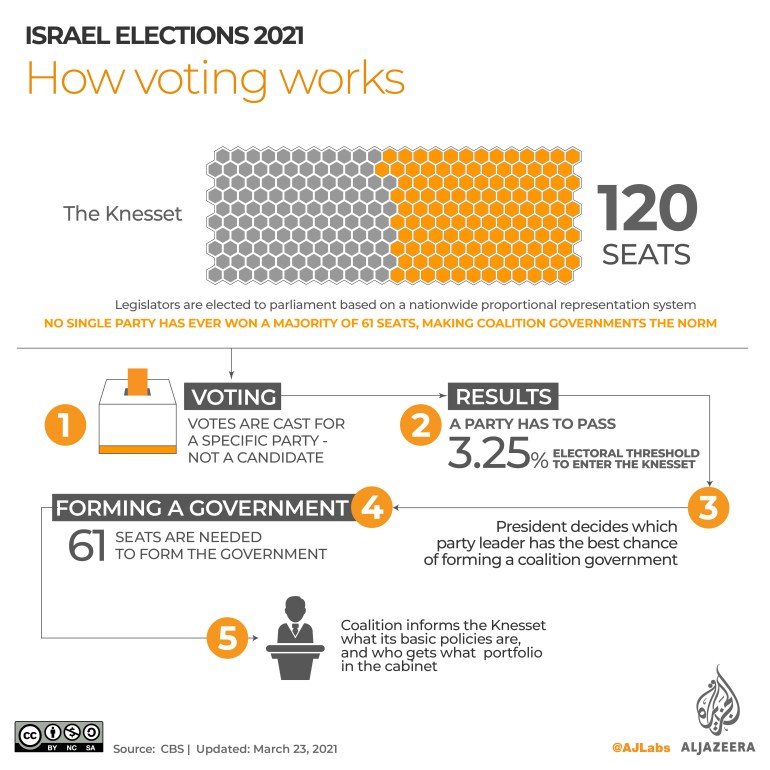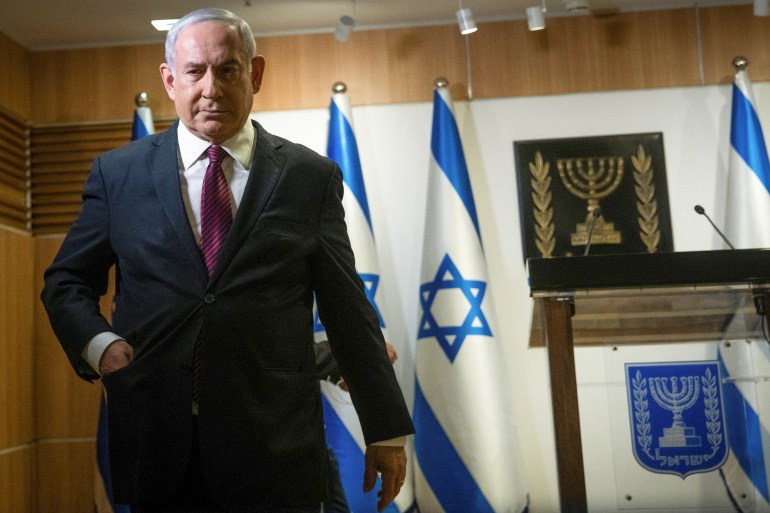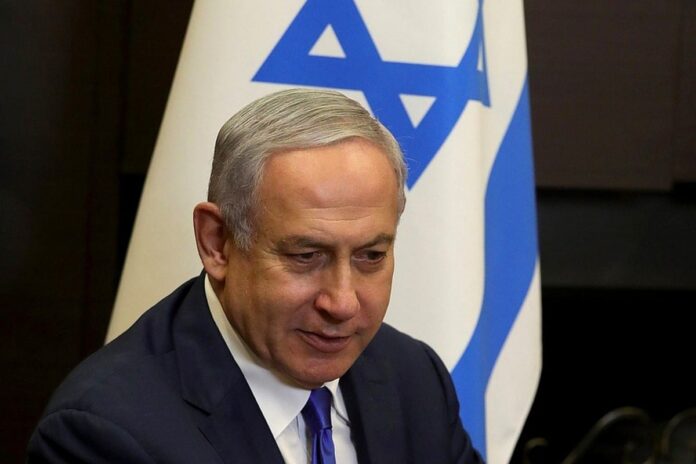Without defections, each side needs the support of Mansour Abbas, leader of the United Arab List, to form a government and avoid another election.
![Mansour Abbas, leader of the United Arab List, votes at a polling station in Maghar, Israel [Mahmoud Illean/AP]](https://www.aljazeera.com/wp-content/uploads/2021/03/AP_21083406951354.jpg?resize=770%2C513)
A small Palestinian-Israeli party has unexpectedly won crucial seats in Israel’s election, potentially putting it in a position to choose Israel’s next prime minister.
The United Arab List (UAL), also known by the Hebrew name Ra’am, appears to have clinched just five seats in the 120-member Knesset, but it could decide whether Benjamin Netanyahu, Israel’s longest-serving prime minister, remains in office.
- Mass shootings add to mental health issues already affected by COVID-19
- Hong Kong halts BioNTech COVID-19 vaccines, investigates packaging
It is an odd predicament for Netanyahu, who rose to power by rejecting compromise with the Palestinians and has used racist rhetoric in past campaigns to cast the country’s Arab minority as a fifth column of “terrorist” sympathisers.
With about 90 percent of votes counted on Wednesday, Netanyahu, 71, and his natural allies, and the bloc opposing him, each lack a 61-seat majority in the Knesset.
Unless another party decides to switch sides, each would need the support of Mansour Abbas, leader of the UAL, to form a government and avoid yet another round of elections.
In Israel’s fourth elections in two years, Netanyahu sought Arab support in what many saw as a two-pronged strategy aimed at picking up votes and splitting the Joint List, an alliance of Arab parties that won a record 15 seats in the elections last year.
In this vote, Abbas split from the Joint List and ran a separate party.
“The key development since the polls closed has been the entry into parliament of this small offshoot of the Arab Joint List – the Ra’am party or the United Arab Joint List led by Mansour Abbas,” said Al Jazeera’s Harry Fawcett, reporting from West Jerusalem.
“His philosophy is conservative Islamist. He has been moving his party over the past 12 months into a more pragmatic space in Israeli politics, talking about being open to engage with various parties – especially if they promise to do what is necessary in the Palestinian-Israeli sector for his constituents. So he is leaving himself open to working with either the pro- or anti-Netanyahu bloc.”

‘Not realistic’
There is also a chance that Naftali Bennett, 48, a right-wing leader who also remains uncommitted, throws his support behind the anti-Netanyahu bloc. In that case, it could dispense with the UAL if it maintained the support of the larger Arab Joint List. Netanyahu could also potentially form a coalition without the UAL if he convinces members of the other bloc to defect.
Marwan Bishara, Al Jazeera’s senior political analyst, said the situation with Abbas as a possible kingmaker “is extraordinary but not realistic”.
“Theoretically anything can happen. But I don’t think in real life we are going to see Naftali Bennett of the extreme right sit with Abbas. Certainly, you won’t see the Zionist Religious party – the most extreme of the most extreme fundamentalist Jewish parties – sitting together in the same coalition with an Islamist party. What we will see in the next 45 days is a lot of manoeuvring,” said Bishara.
Arabs make up about 20 percent of Israel’s population of 9.3 million. They have citizenship, speak fluent Hebrew, and are well-represented in the medical profession and at universities.
But they face widespread discrimination in housing and public services. In recent years, they have held regular protests condemning violent crimes and accusing Israeli authorities of failing to do enough to protect their communities, allegations rejected by the police.

Israel’s Arab citizens have close family ties to Palestinians in the West Bank and Gaza and largely identify with the Palestinian cause. That has led many Israeli Jews to view them with suspicion, something Netanyahu and other right-wing leaders have capitalised on in previous elections.
Ahead of polls in 2015, Netanyahu drew criticism after warning his supporters that Arabs were voting “in droves”. In 2019 he pushed for the placement of observers and cameras at polling stations in Arab areas, which critics said was an attempt to intimidate voters.
It remains to be seen whether those remarks will come back to haunt him.
Another victory would extend his 12 years in power — already the longest in Israeli history. Defeat would likely mean the end of his political career and leave him increasingly vulnerable to prosecution and potential jail time as his trial on corruption charges proceeds. Or the country could plunge into another election campaign, prolonging two years of deadlock.
Horse trading
As it stands, Likud is projected to be the largest party with 30 seats, fewer than its current 36. The opposition centrist party Yesh Atid, which is headed by 57-year-old Yair Lapid, trails with 17 seats.
An alliance with Netanyahu’s opponents from the centre-left seems to be a political stretch.
“There is an extremely complex, contradictory jigsaw of coalition-building as they try to survey and pick up the pieces from this election,” said Fawcett.
Netanyahu had campaigned on his leadership credentials based on a world-beating COVID-19 vaccination rollout that has enabled nearly 50 percent of Israelis to receive two vaccine shots already.
But charges of bribery, fraud and breach of trust, which Netanyahu has denied in an ongoing corruption trial, as well as economic hardships during three nationwide coronavirus lockdowns, have weighed on his popularity.
Yohanan Plesner, president of the Israel Democracy Institute, a non-partisan think-tank, said exit polls showed the country remained divided and a fifth national election remained a real option.
“At the same time, if Bennett joins his coalition, Netanyahu is closer than ever to a narrow government including the most extreme elements of Israeli society,” Plesner said.


